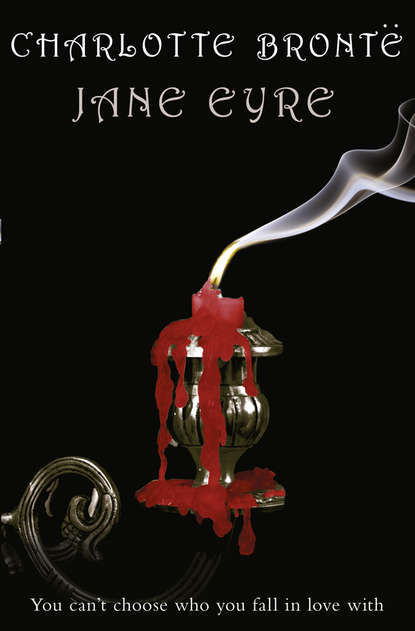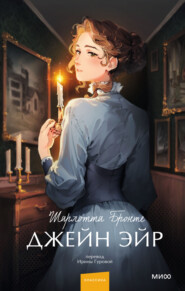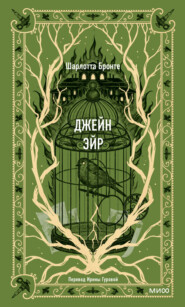По всем вопросам обращайтесь на: info@litportal.ru
(©) 2003-2024.
✖
Jane Eyre
Настройки чтения
Размер шрифта
Высота строк
Поля
‘Let her stand half an hour longer on that stool, and let no one speak to her during the remainder of the day.’
There was I, then, mounted aloft: I, who had said I could not bear the shame of standing on my natural feet in the middle of the room, was now exposed to general view on a pedestal of infamy. What my sensations were, no language can describe; but just as they all arose, stifling my breath and constricting my throat, a girl came up and passed me: in passing, she lifted her eyes. What a strange light inspired them! What an extraordinary sensation that ray sent through me! How the new feeling bore me up! It was as if a martyr, a hero, had passed a slave or victim, and imparted strength in the transit. I mastered the rising hysteria, lifted up my head, and took a firm stand on the stool. Helen Burns asked some slight question about her work of Miss Smith, was chidden for the triviality of the inquiry, returned to her place, and smiled at me as she again went by. What a smile! I remember it now, and I know that it was the effluence of fine intellect, of true courage; it lit up her marked lineaments, her thin face, her sunken grey eye, like a reflection from the aspect of an angel. Yet at that moment Helen Burns wore on her arm ‘the untidy badge;’ scarcely an hour ago I had heard her condemned by Miss Scatcherd to a dinner of bread and water on the morrow, because she had blotted an exercise in copying it out. Such is the imperfect nature of man! such spots are there on the disc of the clearest planet; and eyes like Miss Scatcherd’s can only see those minute defects, and are blind to the full brightness of the orb.
(#ulink_489a3a6e-3afd-553b-ad81-60111691ccff)
re the half-hour ended, five o’clock struck; school was dismissed, and all were gone into the refectory to tea. I now ventured to descend: it was deep dusk; I retired into a corner and sat down on the floor. The spell by which I had been so far supported began to dissolve; reaction took place, and soon, so overwhelming was the grief that seized me, I sank prostrate with my face to the ground. Now I wept: Helen Burns was not here; nothing sustained me; left to myself I abandoned myself, and my tears watered the boards. I had meant to be so good, and to do so much at Lowood: to make so many friends, to earn respect, and win affection. Already I had made visible progress: that very morning I had reached the head of my class; Miss Miller had praised me warmly; Miss Temple had smiled approbation; she had promised to teach me drawing, and to let me learn French, if I continued to make similar improvement two months longer: and then I was well-received by my fellow-pupils; treated as an equal by those of my own age, and not molested by any; now, here I lay again crushed and trodden on; and could I ever rise more?
‘Never,’ I thought; and ardently I wished to die. While sobbing out this wish in broken accents, some one approached: I started up—again Helen Burns was near me; the fading fires just showed her coming up the long, vacant room; she brought my coffee and bread.
‘Come, eat something,’ she said; but I put both away from me, feeling as if a drop or a crumb would have choked me in my present condition. Helen regarded me, probably with surprise: I could not now abate my agitation, though I tried hard; I continued to weep aloud. She sat down on the ground near me, embraced her knees with her arms, and rested her head upon them; in that attitude she remained silent as an Indian. I was the first who spoke:—
‘Helen, why do you stay with a girl whom everybody believes to be a liar?’
‘Everybody, Jane? Why, there are only eighty people who have heard you called so, and the world contains hundreds of millions.’
‘But what have I to do with millions? The eighty I know despise me.’
‘Jane, you are mistaken: probably not one in the school either despises or dislikes you: many, I am sure, pity you much.’
‘How can they pity me after what Mr Brocklehurst said?’
‘Mr Brocklehurst is not a god: nor is he even a great and admired man: he is little liked here; he never took steps to make himself liked. Had he treated you as an especial favourite, you would have found enemies, declared or covert, all around you; as it is, the greater number would offer you sympathy if they dared. Teachers and pupils may look coldly on you for a day or two, but friendly feelings are concealed in their hearts; and if you persevere in doing well, these feelings will ere long appear so much the more evidently for their temporary suppression. Besides, Jane,’—she paused.
‘Well, Helen?’ said I, putting my hand into hers: she chafed my fingers gently to warm them, and went on:—
‘If all the world hated you, and believed you wicked, while your own conscience approved you, and absolved you from guilt, you would not be without friends.’
‘No; I know I should think well of myself; but that is not enough: if others don’t love me, I would rather die than live—I cannot bear to be solitary and hated, Helen. Look here; to gain some real affection from you, or Miss Temple, or any other whom I truly love, I would willingly submit to have the bone of my arm broken, or to let a bull toss me, or to stand behind a kicking horse, and let it dash its hoof at my chest,’—
‘Hush, Jane! you think too much of the love of human beings; you are too impulsive, too vehement: the sovereign hand that created your frame, and put life into it, has provided you with other resources than your feeble self, or than creatures feeble as you. Besides this earth, and besides the race of men, there is an invisible world and a kingdom of spirits: that world is round us, for it is everywhere; and those spirits watch us, for they are commissioned to guard us; and if we were dying in pain and shame, if scorn smote us on all sides, and hatred crushed us, angels see our tortures, recognise our innocence (if innocent we be: as I know you are of this charge which Mr Brocklehurst has weakly and pompously repeated at second-hand from Mrs Reed; for I read a sincere nature in your ardent eyes and on your clear front), and God waits only the separation of spirit from flesh to crown us with a full reward. Why, then, should we ever sink overwhelmed with distress, when life is so soon over, and death is so certain an entrance to happiness—to glory?’
I was silent: Helen had calmed me; but in the tranquillity she imparted there was an alloy of inexpressible sadness. I felt the impression of woe as she spoke, but I could not tell whence it came; and when, having done speaking, she breathed a little fast and coughed a short cough, I momentarily forgot my own sorrows to yield to a vague concern for her.
Resting my head on Helen’s shoulder, I put my arms round her waist; she drew me to her, and we reposed in silence. We had not sat long thus, when another person came in. Some heavy clouds, swept from the sky by a rising wind, had left the moon bare; and her light, streaming in through a window near, shone full both on us and on the approaching figure, which we at once recognised as Miss Temple.
‘I came on purpose to find you, Jane Eyre,’ said she; ‘I want you in my room; and as Helen Burns is with you, she may come too.’
We went; following the superintendent’s guidance, we had to thread some intricate passages, and mount a staircase before we reached her apartment; it contained a good fire, and looked cheerful. Miss Temple told Helen Burns to be seated in a low arm-chair on one side of the hearth and herself taking another, she called me to her side.
‘Is it all over?’ she asked, looking down at my face. ‘Have you cried your grief away?’
‘I am afraid I never shall do that.’
‘Why?’
‘Because I have been wrongly accused; and you, ma’am, and everybody else will now think me wicked.’
‘We shall think you what you prove yourself to be, my child. Continue to act as a good girl, and you will satisfy me.’
‘Shall I, Miss Temple?’
‘You will,’ said she, passing her arm round me. ‘And now tell me who is the lady whom Mr Brocklehurst called your benefactress?’
‘Mrs Reed, my uncle’s wife. My uncle is dead, and he left me to her care.’
‘Did she not, then, adopt you of her own accord?’
‘No, ma’am; she was sorry to have to do it: but my uncle, as I have often heard the servants say, got her to promise before he died, that she would always keep me.’
‘Well now, Jane, you know or at least I will tell you, that when a criminal is accused, he is always allowed to speak in his own defence. You have been charged with falsehood; defend yourself to me as well as you can. Say whatever your memory suggests as true; but add nothing and exaggerate nothing.’
I resolved, in the depth of my heart, that I would be most moderate—most correct; and, having reflected a few minutes in order to arrange coherently what I had to say, I told her all the story of my sad childhood. Exhausted by emotion, my language was more subdued than it generally was when it developed that sad theme; and mindful of Helen’s warnings against the indulgence of resentment, I infused into the narrative far less gall and wormwood than ordinarily. Thus restrained and simplified, it sounded more credible: I felt as I went on that Miss Temple fully believed me.
In the course of the tale I had mentioned Mr Lloyd as having come to see me after the fit: for I never forgot the, to me, frightful episode of the red-room; in detailing which, my excitement was sure, in some degree, to break bounds; for nothing could soften in my recollection the spasm of agony which clutched my heart when Mrs Reed spurned my wild supplication for pardon, and locked me a second time in the dark and haunted chamber.
I had finished: Miss Temple regarded me a few minutes, in silence; she then said:—
‘I know something of Mr Lloyd; I shall write to him; if his reply agrees with your statement, you shall be publicly cleared from every imputation: to me, Jane, you are clear now.’
She kissed me, and still keeping me at her side (where I was well contented to stand, for I derived a child’s pleasure from the contemplation of her face, her dress, her one or two ornaments, her white forehead, her clustered and shining curls, and beaming dark eyes), she proceeded to address Helen Burns.
‘How are you to-night, Helen? Have you coughed much to-day?’
‘Not quite so much I think, ma’am.’
‘And the pain in your chest?’
‘It is a little better.’
Miss Temple got up, took her hand and examined her pulse; then she returned to her own seat: as she resumed it, I heard her sigh low. She was pensive a few minutes then rousing herself, she said cheerfully:—
‘But you two are my visitors to-night; I must treat you as such.’ She rang her bell. ‘Barbara,’ she said to the servant who answered it, ‘I have not yet had tea; bring the tray, and place cups for these two young ladies.’
And a tray was soon brought. How pretty, to my eyes, did the china and bright teapot look, placed on the little round table near the fire! How fragrant was the steam of the beverage, and the scent of the toast! of which, however, I, to my dismay (for I was beginning to be hungry), discerned only a very small portion: Miss Temple discerned it too:—
‘Barbara,’ said she, ‘can you not bring a little more bread and butter? There is not enough for three.’
Barbara went out: she returned soon:—
‘Madam, Mrs Harden says she has sent up the usual quantity.’
Mrs Harden, be it observed, was the housekeeper: a woman after Mr Brocklehurst’s own heart, made up of equal parts of whalebone and iron.
‘Oh, very well!’ returned Miss Temple; ‘we must make it do, Barbara, I suppose.’ And as the girl withdrew, she added, smiling, ‘Fortunately, I have it in my power to supply deficiencies for this once.’
Having invited Helen and me to approach the table, and placed before each of us a cup of tea with one delicious but thin morsel of toast, she got up, unlocked a drawer, and taking from it a parcel wrapped in paper, disclosed presently to our eyes a good-sized seed-cake.
‘I meant to give each of you some of this to take with you,’ said she; ‘but as there is so little toast, you must have it now,’ and she proceeded to cut slices with a generous hand.

















